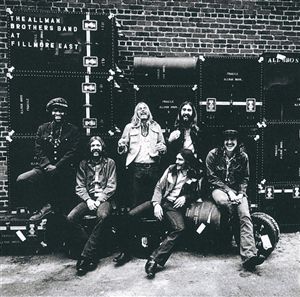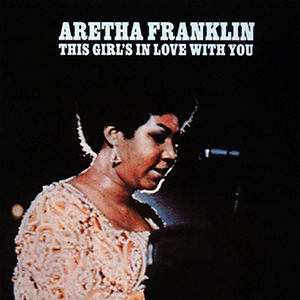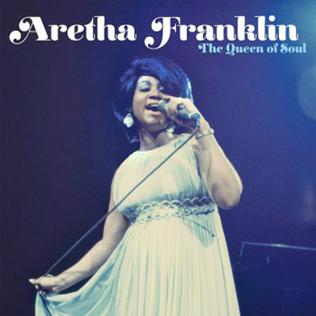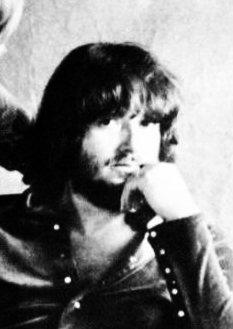
Atlantic Recording Corporation is an American record label founded in October 1947 by Ahmet Ertegun and Herb Abramson. Over the course of its first two decades, starting from the release of its first recordings in January 1948, Atlantic earned a reputation as one of the most important American labels, specializing in jazz, R&B, and soul by Aretha Franklin, Ray Charles, Wilson Pickett, Sam and Dave, Ruth Brown and Otis Redding. Its position was greatly improved by its distribution deal with Stax. In 1967, Atlantic became a wholly owned subsidiary of Warner Bros.-Seven Arts, now the Warner Music Group, and expanded into rock and pop music with releases by Crosby, Stills, Nash & Young, Led Zeppelin, and Yes.

Sam & Dave were an American soul and R&B duo who performed together from 1961 until 1981. The tenor (higher) voice was Sam Moore and the baritone/tenor (lower) voice was Dave Prater (1937–1988).

At Fillmore East is the first live album by American rock band the Allman Brothers Band, and their third release overall. Produced by Tom Dowd, the album was released on July 6, 1971 in the United States, by Capricorn Records. As the title indicates, the recording took place at the New York City music venue Fillmore East, which was run by concert promoter Bill Graham. It was recorded over the course of three nights in March 1971 and features the band performing extended jam versions of songs such as "Whipping Post", "You Don't Love Me" and "In Memory of Elizabeth Reed". When first commercially released, it was issued as a double LP with just seven songs across four vinyl sides.

Lady Soul is the twelfth studio album by American singer Aretha Franklin released in early 1968 by Atlantic Records. The album stayed at #1 for sixteen weeks on Billboard's R&B album chart, and it hit number 2 on the pop album chart during a year-long run.

Howard Duane Allman was an American rock and blues guitarist and the founder and original leader of the Allman Brothers Band, for which he was posthumously inducted into the Rock and Roll Hall of Fame in 1995.

"Layla" is a song written by Eric Clapton and Jim Gordon, originally recorded with their band Derek and the Dominos, as the thirteenth track from their only studio album, Layla and Other Assorted Love Songs (1970). Its contrasting movements were composed separately by Clapton and Gordon. The piano part has also been controversially credited to Rita Coolidge, Gordon's girlfriend at the time.

Gerald Wexler was a music journalist turned music producer, and was a major influence on American popular music from the 1950s through the 1980s. He coined the term "rhythm and blues", and was integral in signing and/or producing many of the biggest acts of the time, including Ray Charles, the Allman Brothers, Chris Connor, Aretha Franklin, Led Zeppelin, Wilson Pickett, Dire Straits, Dusty Springfield and Bob Dylan. Wexler was inducted to the Rock and Roll Hall of Fame in 1987 and in 2017 to the National Rhythm & Blues Hall of Fame.

Thomas John Dowd was an American recording engineer and producer for Atlantic Records. He was credited with innovating the multitrack recording method. Dowd worked on a veritable "who's who" of recordings that encompassed blues, jazz, pop, rock, and soul records.

Delaney & Bonnie was an American duo of singer-songwriters Delaney Bramlett and Bonnie Bramlett. In 1969 and 1970, they fronted a rock/soul ensemble, Delaney & Bonnie and Friends, whose members at different times included Duane Allman, Gregg Allman, Eric Clapton, George Harrison, Leon Russell, Bobby Whitlock, Dave Mason, Steve Howe, Rita Coolidge, and King Curtis.
Criteria Studios is a recording studio in North Miami, Florida, founded in 1958 by musician Mack Emerman. Hundreds of gold, platinum, and diamond singles and albums have been recorded, mixed or mastered at Criteria, for many notable artists and producers.

Idlewild South is the second studio album by American rock band the Allman Brothers Band. With the exception of one song, the album was produced by Tom Dowd and was released on September 23, 1970 in the United States, by Atco Records and Capricorn Records. Following the release of their 1969 debut, the Allman Brothers Band toured the United States extensively to promote the album, which had little commercial success. Their performances, however, did create positive word of mouth exposure that extended to more famous musicians, such as Eric Clapton, who invited group leader Duane Allman to contribute to his 1970 album Layla and Other Assorted Love Songs.
"I Never Loved a Man (The Way I Love You)" is a 1967 single released by American soul singer Aretha Franklin. Released on Atlantic Records as the first big hit of her career and the lead single from her tenth studio album of the same name, it became a defining song for Franklin, peaking at number one on the rhythm and blues charts and number nine on the pop charts. The B-side was "Do Right Woman, Do Right Man". Before this Franklin had placed only two Top 40 singles on the pop chart during her modest tenure with Columbia Records.

Ron and Howard Albert, known as the Albert Brothers, are an American record production duo best known for their work in audio engineering and as record producers, working on recordings at Criteria Studios in Miami, Florida, and Audiovision studios both in the United States. Their immense body of work spanning seven decades includes influential albums such as Layla and Other Assorted Love Songs by Derek and the Dominos, Eat a Peach by The Allman Brothers, Young Gifted and Black by Aretha Franklin, Manasas, and numerous works with Crosby Stills and Nash such as CSN, Stephen stills 2. Howard Albert has said "I think we have 40 gold records to our name and about 30 or so platinum." They were inducted into the Florida Music Hall of Fame in 2013.

This Girl's in Love with You is the sixteenth studio album by American singer Aretha Franklin, released on January 15, 1970 by Atlantic Records. It reached Billboard's Top 20 and was reissued on compact disc through Rhino Records in 1993. Her version of The Beatles' "Let It Be" was the first recording of the song to be commercially issued. Songwriter Paul McCartney sent Franklin and Atlantic Records a demo of the song as a guide.

Memphis Underground is a 1969 album by jazz flutist Herbie Mann, that fuses the genres of jazz and rhythm and blues (R&B). While Mann and the other principal soloists were leading jazz musicians, the album was recorded in Chips Moman's American Sound Studio in Memphis, a studio used by many well-known R&B and pop artists. The rhythm section was the house band at American Studios. The recording was engineered and produced by Tom Dowd.

Roger G. Hawkins was an American drummer best known for playing as part of the studio backing band known as the Muscle Shoals Rhythm Section of Alabama. Rolling Stone ranked Hawkins number 31 on its list of greatest drummers.

Queen of Soul: The Atlantic Recordings is an 86-track, four-disc box set detailing Aretha Franklin's Atlantic career, starting in 1967 with the landmark single "I Never Loved a Man " and ending with 1976's "Something He Can Feel".

Delaine Alvin "Delaney" Bramlett was an American singer and guitarist. He was best known for his musical partnership with his wife Bonnie Bramlett in the band Delaney & Bonnie and Friends, which included a wide variety of other musicians, many of whom were successful in other contexts.
Atlantic Studios is the recording studio network of Atlantic Records. Although the historic recording studio was located at 1841 Broadway, in New York City, Atlantic Recording Studios was initially located at 234 West 56th Street from November 1947 until mid-1956. When the Shorty Rogers and His Giants disc of 33.33 rpm called Martians Come Back! was issued in August 1956, the address of Atlantic Recording Studios had relocated to 157 W 57th Street. The studio was the first to record in stereo due to the efforts of Tom Dowd. The new Atlantic Studios includes a network of label-operated studios spanning New York, Atlanta, and California.
Adrian Barber was an English musician and producer most noted for recording the Beatles Live! at the Star-Club in Hamburg, Germany; 1962, producing the Allman Brothers Band's self-titled debut album, along with the Velvet Underground's album Loaded.
















